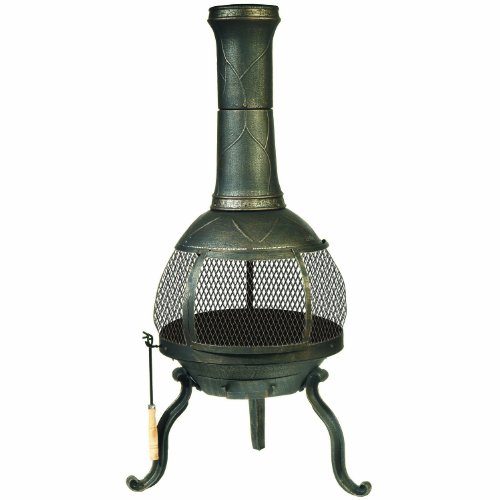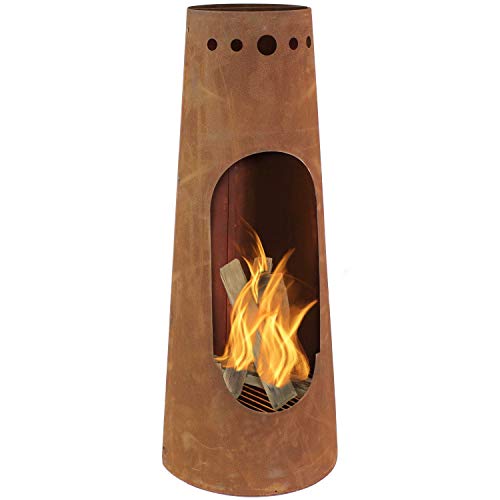See What Propane Chiminea Tricks The Celebs Are Using
페이지 정보

본문
 A Propane Chiminea Will Keep Your Patio Cozy For Hours
A Propane Chiminea Will Keep Your Patio Cozy For HoursKeep your patio warm during outdoor lunches, cocktails and dinners with a starlit sky with this propane chiminea. Choose the model that best caters to your space and aesthetic preferences while focusing on security and maintenance requirements.
A freestanding fireplace that is front-loaded with a bulbous body and vertical chimney, chimineas (pronounced chee-mi-NEH'yah) are a great option for any outdoor living space. Like other wood-burning patio heaters, they offer a cosy ambience that is easy to manage.
Safety
A chiminea, also known as a outdoor fireplace is designed to burn an open flame for a long period of time. It is made from clay or metal, and resembles the shape of a vase, with an chimney that directs smoke. It is an excellent choice for a garden in which you need to heat it as well as cook. Certain models come with an oven on the top which can be used to cook meals on the fire. A chiminea should be placed on a safe surface such as brick, concrete, or stone patios. It should be kept at least 30 feet away from houses and other structures that are combustible.
Chimineas are safer than fire pits, because the smoke and flames are contained in the structure. This makes them less vulnerable to injuries and accidents. It's also easier to manage the size of the fire in a chiminea because air is able to enter the front of the bowl and is directed towards the stack. This natural draft keeps the fire burning for a long time with minimal effort on your part.
You can also utilize a chiminea to add ambiance to your outdoor living area because it generates radiant heat and provides an authentic campfire feel. It also creates a cozy environment for family and friends to relax in the evening. You can also add logs to the fire to create an atmospheric crackle.
Chimines can be more difficult to maintain and set up than a firepit. You must place sand on the bottom of a chiminea, unlike a firepit, before lighting the fire. This is essential to prevent the clay from cracking when it is heating up. You must also place it on a fire-proof surface and keep it 10 to 20 feet from trees, walls fences, fences and other combustible structures.
Both chimineas and fire pits are excellent to heat your home. But it's important to choose the right one. Consider the aesthetic preferences as well as the maintenance requirements and the efficiency of each model to make an informed decision. Think about your lifestyle, such as whether you'll use the heater to entertain guests or for quiet family gatherings.
Fuel
The propane chiminea can be used to cook or heat. The majority of chimineas are made from clay, although cast iron and steel are also available. Some models even combine two kinds of materials and give you a classic-looking chiminea with the added benefit of gas-powered heat.
The fuel you choose for your indoor chiminea will influence the duration of time it burns, its temperature and other elements. You'll need to think about the short and long-term fuel expenses and maintenance and installation costs.
Propane has many advantages over ethanol or wood. It's smellless and offers a lot of heat at a low cost. It is a widely used ingredient employed in cookware and heaters, so you shouldn't have any difficulty finding it. It's not necessary to spend a lot of time maintaining a propane fire because it's usually started by switching a switch.
There are some disadvantages of using a chiminea powered by propane. It's not as environmentally friendly as wood or ethanol. It's a fossil fuel, the result of natural petroleum refining and gas processing. It's not good for the environment and may cost more than ethanol or wood.
You should also consider the smoke produced by your chiminea, as well any local regulations that may apply to outdoor burning. Kiln-dried firewood or heat logs are a fantastic choice for chimineas because they release very small amounts of smoke. They are also safe for use in Smoke Control Areas.
In the end, your decision to choose a chiminea or fire pit will be based on to personal preference and lifestyle needs. Both are a focal point in an outdoor space. However, you might want to consider the safety features and maintenance requirements prior to making the decision. It is also important to think about how often you'll use your outdoor firepit or chiminea, so that you can choose the appropriate kind of fuel. With careful consideration, you will be able to make the right purchase and take pleasure in the warm glow of your new chiminea for years to be.
Ventilation
If you're a fan of outdoor fires, a chiminea could be the perfect choice. They're a great source of heat and style, and they also have a natural draft that keeps the fire burning without much tending. You'll spend less time fussing about the flames, and more time with your family and friends.
Chimineas are designed with a stack and bowl that creates a natural draft. The air flows into the bowl's front, travels up through the stack, and then exits through the top. This design helps reduce the amount of smoke and ash that is produced which makes it safer for you to sit nearer to the flame. You can use a chiminea indoors, but you must keep it away from anything that could ignite as sparks are constantly flying around.
If your chiminea emits lots of smoke, there are many ways to cut down on the amount. One option is to use an energy source that doesn't generate lots of smoke, such as Duraflame logs for ceramic chimineas. You can also set your chiminea away from wind. These two tips will make it easier to relax and enjoy your chiminea with no worries about annoying your neighbors or damaging the furniture on your patio.
Chimineas made of clay are as strong as cast iron or steel models, but they need to be protected from the elements. Applying a sealer on the exterior of the chiminea can be a good way to protect it. This will help protect it from cracking and fade because of exposure to sunlight. Reapply the coating every 6 to 8 weeks of use.
When you are ready to light a fire, you can place your chiminea on the stand that came with it. Don't place it on a flammable area like a deck. Also, clear out any combustible or debris surrounding it prior to lighting an ignition.
If you are a frequent starter of fire it is essential to spruce up your Chiminea prior to when you begin using it regularly. It is best to use only small amounts of dried, seasoned wood and kindling to create your initial small fires. These initial small, controlled burns will help to seal the clay and reduce hair-line cracks that could otherwise become problematic.
Maintenance
It is crucial to keep your chiminea in good condition as you would any other outdoor furniture. If you regularly clean it and protect it from the elements using a waterproof cover and cover, it will last for longer.
Chimineas can crack if they are not maintained correctly. Alongside the obvious - don't drop it or pound it with a hammer poor methods of burning and not keeping up with maintenance can also lead to a cracked clay Chiminea.
A good chiminea indoor guide is essential. It should be included with your chiminea and should detail how often you should clean it, as well as any specific techniques to keep the clay in good condition. The majority of people use the 'bicarbonate of soda paste' cleaning method that was previously described, and do this about 2-3 times per year or more frequently in the summer months when you use it the most. After cleaning your chiminea, it's worth giving it a quick rinse with clean water. Then, return the sand or gravel back to the base's bottom.
If you are worried about cracking, it may be worth considering a cast-iron chiminea. It is much more durable than clay versions. However casting iron chimineas are susceptible to rust therefore you'll need ensure that they're kept dry and that they aren't placed close to fire-prone materials.
In addition to cleaning your chiminea, it's also recommended to purchase a grates for it as well as a weatherproof, sturdy cover like this one on Amazon, that will prevent any harm while you're not making use of it. A grate is particularly useful when you're using your chiminea in a living area with furniture that is soft and can aid in stopping scorching ash from exploding everywhere.
A chiminea can reduce the amount of smoke produced in your outdoor space. It has an enclosed chimney that funnels smoke towards the sky and away from those who are smoking or enjoying a fire. However, it's an ideal idea to select wood that has been seasoned to reduce the risk of sparking as this can create lots of smoke.

- 이전글The 10 Most Scariest Things About Misted Glass Replacement 24.10.27
- 다음글Diyarbakır Escort Esin 24.10.27
댓글목록
등록된 댓글이 없습니다.

